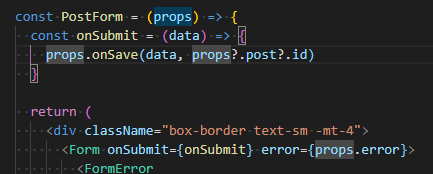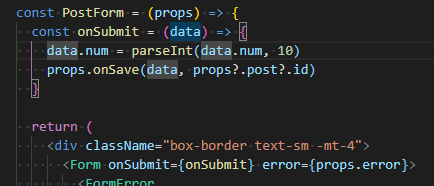-
Notifications
You must be signed in to change notification settings - Fork 994
New issue
Have a question about this project? Sign up for a free GitHub account to open an issue and contact its maintainers and the community.
By clicking “Sign up for GitHub”, you agree to our terms of service and privacy statement. We’ll occasionally send you account related emails.
Already on GitHub? Sign in to your account
Error when submitting scaffolded form with Int field #608
Comments
|
Hmmm, we have code that handles this in the scaffold, I'm not sure why it wasn't added for you... So you end up with: const onSave = (input) => {
const castInput = Object.assign(input, { num: parseInt(input.num) })
createPost({ variables: { input: castInput } })
}What version of Redwood generated that scaffold? I want to say this casting was released in 0.6.0? Maybe 0.7.0? |
|
I'm on Redwood 0.7.0 This is the line you linked to My field name does not end with |
|
Ahhh that's right, this was only so that foreign key references to other tables would be handled correctly. Well shoot. We may want to coerse more than ints in the future...what you do think about a higher level check that avoids having to do it inline in the onSubmit handler? We've been looking at integrating Yup which would allow you to define the datatypes of all the fields in your form and then the I'm not thrilled about yet another place you have to define your schema datatypes (schema.prisma and GraphQL SDL are already two places), but this Int issue has come up several times and we've got another issue about dealing with Booleans. Adding Yup wouldn't add any overhead on scaffolds since we can generate that schema for you. We'll just have to let people know to either write a coercement manually in onSubmit, as we've been doing above, or write themselves a Yup schema. Maybe we can even add a little CLI tool that turns the model definition in your schema.prisma into the equivalent Yup schema and outputs it to the terminal. Then you can copy/paste into your component... @thedavidprice your Yup dreams may be coming true! |
Yes, this was the first thing that came to my mind as well. I guess there are two ways to think about this. I have a colleague who is firmly in the "if you can't do it properly, don't do it at all"-camp. Myself I'm more in the "anything is better than nothing"-camp.
I've never used react-hook-form before (we have our own form implementation that we're using), and I've never even heard of yup before. So can't comment much on all that
I'm 100% with you on that one!
Or (try to) generate the coercement with the template... If/when Redwood moves to TypeScript, how relevant would Yup be? I mean, the |
Maybe? I honestly have next to no knowledge of Typescript and how/where/when types are introduced in this chain. I think the idea of Yup is that it would properly enforce and coerce types, so |
|
I'm in bed now, I'll write up some code tomorrow to show how I think it
would/could look with TS support. But yes, another type definition would be
needed. Hopefully it can be generated from the Prisma schema though
…On Thu, May 28, 2020, 01:08 Rob Cameron ***@***.***> wrote:
Does that mean that the data object that we get in onSubmit would already
have the correct types for everything? Thus making this a non-issue?
Maybe? I honestly have next to no knowledge of Typescript and
how/where/when types are introduced in this chain. I think the idea of Yup
is that it *would* properly enforce and coerce types, so data would be
typed properly, but then where does the type definition for TS come from?
Do we then need *yet another* type definition somewhere? AHHHHH
—
You are receiving this because you authored the thread.
Reply to this email directly, view it on GitHub
<#608 (comment)>,
or unsubscribe
<https://github.com/notifications/unsubscribe-auth/AAAHQSMJTKFIONSP3UT5OZ3RTWMPTANCNFSM4NLLOMGA>
.
|
|
With this schema Parts of the generated form would probably look like this The same interface would also be used in NewPost So, yeah, I don't think the coercion will be needed in any Redwood code (it'll be handled by react-hook-form). But that's only for TS code. If you guys want to support generating both JS and TS projects, then something will still be needed for JS projects. |
|
How does react-hook-form know to do the coercion? Does that happen automatically once you start using Typescript somehow? When we were looking into adding coercion their recommendation was to use Yup... |
|
Looking at react-hook-form, it's clear that they don't do any coercion 😞 They say "it's a feature, not a bug" 😛 Look here for example: react-hook-form/react-hook-form#1116 https://codesandbox.io/s/react-hook-form-typescript-d68q4 So, back at square one? Even with TS we'd have to do our own coercion. |
|
Late to the party but excited to see this conversation in progress! Thanks for jumping in @Tobbe 🚀 I'm also lacking proper TS skills, so a basic question/clarification:
const PostForm = (props: Props) => {
const formMethods = useForm<FormData>();But, in this case, won't we still need to perform the cast/coercion at run-time for both TS and JS given that On it's own, React Hook Form does not do this for us (unless I'm misunderstanding). They give some examples on this page, but it requires Yup. |
|
It seems very anti-Redwood to have the type definitions for your schema defined in four different places:
We've got another issue that suggests adding a fifth—validations in the service! This seems like the opposite of everything we're trying to do—make your development experience easier. Any ideas @mojombo? |
|
@thedavidprice You are absolutely right. The compiler says the type is |
|
@Tobbe our messages are in sync and just crossed paths! Sorry mine's basically redundant. I do think this is of high value for Redwood. But not sure how high priority at this time. Regardless, two ideas for ways forward:
Here was a quick search result article on RHF that mentions some pros/cons of also using Yup. Any interest in trying out a simple spike or even POC? |
|
@cannikin 100% agree. Couple thoughts/mentions:
|
|
@cannikin Everyone's first reaction to TS is "OMG, all the extra code, ain't nobody got time for that (╯°□°)╯︵ ┻━┻" For personal projects I still go for JS, but for anything serious and/or with multiple people I actually think TS is worth it. The time lost to the extra typing (in both senses of the word 😉) is saved thanks to the extra editor help you get, and the fewer bugs introduced. @thedavidprice spike/POC of our own casting, or of yup? Or both? |
^^ This would be representative of my current state of TS "evolution" 😆But been encouraged as I've learned more about how simple employing it can be. And, also, having a hybrid-language project is 100% supported. So baby steps...
🤩^^ If you're up for it, pick your poison! (Or suggest a different path.) But in that case, please don't get too far out in front of @cannikin and me as you go. We'll need to take things in pieces, e.g. just try it on one field/type, and also need to figure out what kind of DX would be appropriate for Redwood (see Rob's comment above). So maybe something like this to start:
@cannikin Am I already getting too far ahead here... thoughts/suggestions about how to set this up for (digestible) success? |
|
HA I come from almost 15 years of Ruby and can probably count on one hand all the type errors I've ever seen because I passed an Integer instead of a String. I don't think anyone can convince me that the additional days/months I would have spent writing type definitions over that time would have been worth it! 😄 What does the editor support look like? I tend to ignore any little box that pops up because any time I've glanced at it it's been some obscure object definition syntax that does me no good for what I'm working on. Or is it a red squiggle? Which I also usually ignore and just deal with the console error when it pops up! I think we're going to discuss this one in our team meeting on Tuesday and see what we can do. I'll check back in after that! |
|
Old dogs, new tricks, and all that... I was the biggest opponent of TS, and nothing anyone could have told me would have convinced me otherwise. Not until I actually tried it for a couple of projects did I actually start appreciating it. But I think we've slipped pretty far away from what this issue was supposed to be about :D So, to try to bring it back to point, I could start by creating a PR for our own casting of perhaps only numbers and booleans. Ideally someone would also create a PR for a yup solution. So the two can be compared. But I don't want to over commit, so I'll just do one for our own casting first. |
|
Sounds good! @thedavidprice and I were talking separately and he reminded me of this issue #418 where folks are talking about code generation to make "GraphQL operations type-safe". The ultimate solution to this might be something similar if we want to keep the types in sync with the database schema, but without making the user keep them in sync themselves. |
|
@Tobbe OKAY we discussed in our weekly meeting and we have a plan! Rather than go full Yup we think we came up with a lower touch version that doesn't involve any special work on the part of the user, other than making sure they use the correct input Field type—we'll do the coercion for them. This involves three changes:
We can see how far that gets us and if we even need to go to Yup. And as for Typescript, as long as the form data is being used in a mutation @peterp thinks we can automatically use the mutation type as the TS type for the There are two PRs that still need to merge, we should probably wait for that before making any changes: #590 and #495 Are you still interested in working on this or should I take a stab at it? |
|
Sounds like a great plan. I'm very interested in working on it 🙂 |
|
Absolutely, thanks again for taking this on! This PR is nice because it adds a lookup for mapping a field type to the input type that's output in the generator, so we can leverage that for Int: #495 Then this PR creates a single generic |
|
Now that the PR(s) this one depended on have been merged, I'll take a look at this again. Most likely today or tomorrow |
|
I've got a branch up with a fix for this. I have not created a PR yet though, as the code depends on #732 |
|
I refactored the code a bit, new commit here Tobbe@e962bf4 |
When defining a model with an Int field, and then running
yarn rw scaffold <name>the generated form doesn't properly handle that Int field. See screenshot belowWould you be interested in a PR that updates the scaffolding template to look something like this?
Generated code without the change above:

Generated code with the change above (plus some whitespace tweaks):

The text was updated successfully, but these errors were encountered: